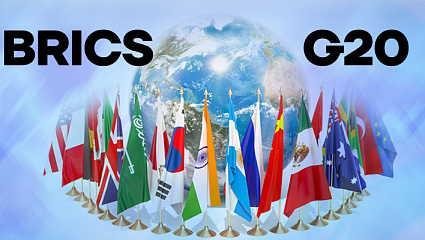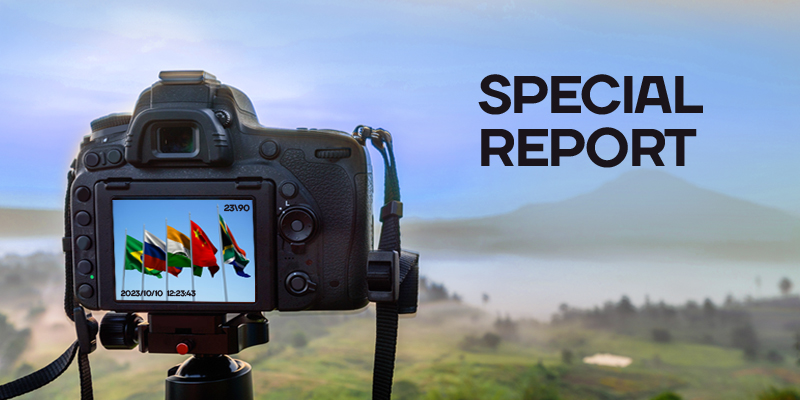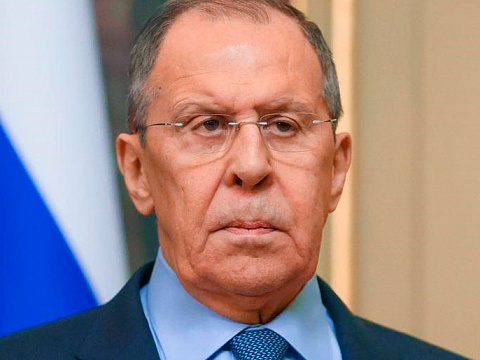Joint Declaration of the X Meeting of the BRICS Ministers of Agriculture and Agrarian Development
1. We, the Ministers of Agriculture of the Federative Republic of Brazil, the Russian Federation, the Republic of India, the People's Republic of China and the Republic of South Africa, met on September 23, 2020, at the X Meeting of the BRICS Ministers of Agriculture and Agrarian Development and discussed issues of common interest on BRICS agricultural development and pointed the way forward for our agricultural cooperation.
2. We recognize that BRICS members are important emerging markets and vibrant nations representing about 42% of the population, 23% of the GDP, 30% of the territory and 18% of the world trade, and are an important force in recent global political dialogues on economic, social and environmental matters.
3. We affirm the importance of establishing the framework for mutual cooperation in the face of current economic challenges, and in this regard, we highly appreciate the work of the Russian Federation in developing the Strategy for BRICS Economic Partnership 2025.
4. Taking into account that the BRICS countries have significant natural resources, make significant contribution to world food production, producing about a third of the global agricultural output, we emphasize our role and responsibility in ensuring the sustainability of the agriculture and food sector, global food security and nutrition.
5. We are pleased to note the 10-year progress of our cooperation achieved since the 1st Meeting of the BRIC Agriculture Ministers held in Moscow in 2010. Acting in accordance with the previous BRICS declarations on agricultural matters and in line with the Brazilian declaration of the 11th BRICS Summit, we reaffirm our commitment to further strengthen cooperation in the field of agriculture, based on the Action Plan 2017-2020 for Agricultural Cooperation of BRICS Countries, in particular, on trade and investment promotion, using digital technologies for sustainable agricultural development, implementing the 2030 Agenda for Sustainable Development and international assistance programs for development, achieving food security, ensuring food safety, improving nutrition and support for vulnerable groups of the population, as well as in other areas of mutually beneficial cooperation.
6. We express concern that, after a decade of steady decline, the number of people who suffer from hunger has gradually increased. Currently, more than 820 million people in the world are still hungry, about 2.5 billion experience moderate or severe food insecurity or suffer from micronutrient deficiency that affect their health. We are aware of the significant challenges to be addressed to ensure food security for the world's population, which is expected to reach 8.6 billion by 2030. In this regard, the monumental objective of achieving the goal of “zero hunger” by 2030 has become increasingly relevant and we reaffirm our commitment to the 2030 Agenda for Sustainable Development and, in particular, to the goals related to agriculture.
7. We take note and are seriously concerned by the new challenges and threats that stand in the way of building sustainable food systems and global food security, and in particular the risks posed by COVID-19. We are deeply saddened by the devastating human losses and suffering caused by this pandemic and will step up efforts to prevent the health crisis to develop into a food crisis. We emphasize the need for a targeted, proportionate, transparent, temporary and consistent with WTO rules approach when taking urgent response measures in connection with the spread of COVID-19 and minimizing the impact of these measures on the functioning of global food supply chains, the stability of agricultural markets, the income and working conditions of farmers, fishermen and other people working along the food supply chain, as well as long-term strategies to achieve sustainable and productive global food systems. We see trade as an important aspect of a future recovery and believe that trade has to be part of a comprehensive solution that promotes production-led response to COVID-19 and food security. In this regard we call for rolling back those trade and production distorting agricultural measures put in place in response to COVID-19 and its effects, in a timely and effective manner, and to ensure they do not become entrenched and continue to distort global trade. We also encourage international organizations to monitor the impact of COVID-19 on the agri-food sector, to analyse the impacts of COVID-19 on the food and livelihood security of small scale, resource poor farmers in developing countries and to inform about necessary measures to increase the sustainability of the food system.
8. We are fully aware of the importance of the full implementation of the potential of the agriculture and food sector of the BRICS countries to fight hunger and malnutrition in all its forms, eliminate poverty, ensure the prosperity of the world economy and local communities and achieve inclusive growth and sustainable development. In this context, we commit ourselves to work together on the following issues. Trade and Investment Promotion
9. We reaffirm that international trade can be an important driving force behind development and sustained economic growth. We also confirm that a rules-based, inclusive, transparent, non-discriminatory multilateral trading system, as well as substantial trade liberalization, can greatly stimulate the development of the national economies of the BRICS countries.
10. We are convinced that the development of trade in agricultural products and food between our countries is not only a powerful incentive for the development of the agricultural sector of the national economies, but also performs the most important function of providing the population of the BRICS countries with a diverse, high-quality and healthy food. Trade facilitates the access to food during local production shocks and across different production seasons, and acts to prevent domestic shortages. In this regard, we will continue to strengthen efforts and take measures to boost trade in agriculture and food products between the BRICS countries, increase its volume and expand its range.
11. We reaffirm the need for mutual and comprehensive support for the production and promotion in our countries as well as in others of products with the geographical indicator (GI), realizing that the importance of such work is associated with the most important humanitarian, environmental and economic factors: preservation of the identity of the culture of peoples in places of residence and manufacture of products with GI; providing local people with jobs, stable income and decent labour conditions .
12. We reaffirm our intentions to continue efforts to facilitate and harmonize sanitary and phytosanitary procedures and control measures as much as possible in order to expand mutual trade in agricultural products and food between our countries. In this regard, we will promote trade in agricultural products, taking measures in accordance with the WTO Agreement on the Application of Sanitary and Phytosanitary Measures (SPS) and international standards established by the Codex Alimentarius Commission (CAC) and the World Organization for Animal Health (OIE), as well as the International Plant Protection Convention (IPPC). We also welcome the UN resolution on the declaration of 2020 as the International Year of Plant Health and emphasize the importance of plant health for ensuring biodiversity and sustainable agricultural production.
13. We underline the importance of the multilateral trading system based on WTO rules and principles. At the same time, we reaffirm the importance of further reform process provided into the WTO Agreement on Agriculture, in particular the need to address the issue of reducing trade-distorting domestic support. We are also concerned about the increasing use of protectionist non-tariff measures, inconsistent with WTO rules, and we consider it necessary to resist the adoption by WTO members of trade-related measures that contradict the WTO principles and rules. At the same time, we will continue to support WTO playing central role in multilateral trading system and we will work constructively with a view to achieving a positive and balanced outcome in the lead-up to the 12th WTO Ministerial Conference.
14. We also draw attention to the need for systematic and coordinated work to improve the transparency, stability and predictability of agricultural markets. In this regard, we support the work of the Agricultural Market Information System (AMIS). In addition, we recognize the relevance of the exchange of agricultural information and express our intention to reinforce the BRICS information sharing mechanism, exchange basic publicly available agricultural information including by further developing of the Basic Agricultural Information Exchange System (BAIES) of the BRICS countries.
15. We recognize that responsible investment is the driver of sustainable agricultural development, ensuring food security and inclusive economic growth. In this regard, we appreciate the Principles for Responsible Investment in Agriculture and Food Systems developed by the Committee on World Food Security of the Food and Agriculture Organization of the United Nations, the Voluntary Guidelines on the FAO Responsible Governance of Tenure of Land, Fisheries and Forests in the Context of National Food Security, and note the need to expand their use on a voluntary basis.
16. We emphasize the great potential of agricultural investment among the BRICS countries and will take joint actions to improve investment environment in agricultural sphere, facilitating agricultural investment among the BRICS countries. We encourage the development of public-private partnerships, the ongoing efforts of the private sector and other participants involved in the investment dialogue and welcome the mutual actions for improving investment climate in agriculture sphere as well as holding agricultural exhibitions, trade fairs and investment fora to promote trade and investment cooperation. Using Digital Technologies for Sustainable Agriculture Development
17. We confirm that further development of the agricultural sector will be based on the principles of sustainable and smart development. In this regard, the innovative development and joint use of modern agriculture science and technology are becoming more relevant and vital.
18. Digital technologies, as one of the priorities in the development of modern agricultural science and technologies, offer unique opportunities for achieving the goals of the 2030 Agenda for Sustainable Development, for sustainable agriculture and improving its efficiency, rural development, preventing rural youth from migrating to cities by creating more attractive digital jobs, ensuring global food security, developing production and food trade, increasing the capacity to respond to risks related to extreme weather events and climate change, increasing accuracy of monitoring and reporting, preventing degradation, and promoting sustainable use of natural resources.
19. We note that digitalization helps establish relations within the agriculture and food system, reduces inefficiencies and barriers, increases transparency and trust along the whole value chain, and provides continuous access to information. Therefore, we call for an increase in using ICT (Information Communication Technologies) in order to improve the quality and safety of food products, ensure the proper functioning of international traceability systems and prevent crossborder spread of pests as well as animals and plants diseases, optimize the processes of harvesting and processing crops, including reducing food losses, ensuring access for all participants of the agriculture and food system to up-to-date information, openness and forecasting of agrarian products markets, increasing food systems resilience.
20. We note that developments in ICT provide useful tools to support control, inspection and approval procedures as provided for under the SPS Agreement. Therefore, we call for an increase use of appropriate ICT tools in international inspection, certification and traceability systems in order to improve the quality, health and safety of food products, whilst observing the principles as expanded in Annex C of the SPS agreement. We further call for the constant exchange of views and experiences on the use of ICT towards finding appropriate solutions towards facilitating international trade while meeting the Member's appropriate level of sanitary or phytosanitary protection.

21. We acknowledge the establishment of the BRICS Agriculture Research Platform (ARP) in 2016 that is a virtual platform for agricultural research to promote cooperation in the areas of agricultural research, technology, policy, innovations, extension and technology transfer, training and capacity building, and information sharing among the BRICS member countries. We urge the BRICS members to jointly propose actions and commitments towards the implementation of the ARP. We encourage the BRICS members in the light of the COVID-19 pandemic to make commitments to cooperate through the ARP and make available the relevant resources.
22. Recognizing the paramount importance of using ICT in ensuring the timely exchange of the most relevant data and information, we call for accelerated BRICS collaboration over agricultural ICT and an increase in the use of digital solutions to develop existing BRICS initiatives on the exchange of agricultural information (The Basic Agricultural Exchange System) and scientific technologies by reinvigorating the BRICS Agricultural Research Platform.
23. At the same time, we are aware that the increased use of digital technologies presents certain risks, most of which are not typical for agriculture. We call for ensuring online security, confidentiality and the protection of personal data. In addition, we will pursue policies aimed to prevent the digital divide between modern and traditional agricultural practices, including promotion of the development of and equal access to digital infrastructure, the the increase in rural connectivity to the internet and the use of accessible technologies, the increase of awareness and skills in the use of ICT, intensification of the research in this area and regular promotion of the interdisciplinary exchange of best practices and experience among the BRICS countries on the use of ICT in order to ensure timely and appropriate use of ICT by all participants in food systems, especially by small farms, women and youth. In addition, we emphasize the need to strike a balance between new approaches leading to increasing agricultural efficiency on the one hand and the sustainable development of farmers and small ethnic groups in rural areas. We will assist in preventing rapid changes in established relationships in the markets of agricultural products, raw materials and food, due to the use of a large amount of data and the application of artificial intelligence.
24. Considering that investments in financial technologies are almost 5 times higher than investments in digital agriculture, as well as the fact that investments in digital technologies are usually costly and involve risks that are often too large for small farmers, we need to pursue a policy that would increase responsible investments in this industry, create innovative financial mechanisms, develop public-private partnerships and establish better conditions for start-ups, micro, small and medium-sized enterprises (MSMEs) as the main drivers of ICT development.
25. We welcome the activities of the Food and Agriculture Organization of the United Nations (FAO), the G20, IFPRI and other international organizations on promotion of this topic and thank FAO for the development of the Concept of Establishing the Digital Council and are willing to assist in the process of its establishment and activities. Achieving the Sustainable Development Goals of the 2030 Agenda for Sustainable Development
26. We highlight particular importance to the 2030 Agenda for Sustainable Development as a guide to global inclusive growth and emphasize the need for the participation of all key stakeholders. With the utmost seriousness, we are conscious of our role in achieving the goals and targets set before us in the field of agriculture, eradicating hunger, ensuring food security and improving the quality of nutrition and developing sustainable agriculture, combating climate change, achieving the rational use of natural resources and responsible production, promoting economic growth, eliminating poverty, etc. We also reaffirm our commitment with environment protection and its importance to the agri-food production.
27. Acting based on the commitment to the United Nations declaration of the Decade of Family Farming and emphasizing that more than 80% of agricultural producers in the world are small farmers, and that in developing countries small agricultural producers perform environmental, social and cultural functions, we reaffirm our determination to mobilize specific, coordinated actions to overcome challenges faced by family farmers and promote agricultural and rural development. We emphasize the need for a cross-sectoral approach to supporting rural development, including investments in improving infrastructure, promoting digital technologies, building capacity for specialized agricultural services, sustainable natural resource management and providing rural people with access to social services, including education, health care, safe water and sanitation. We believe that the empowerment of women and youth as full participants in agricultural systems should be strengthened to further develop the agriculture and food sector. In this regard, we express our support for the implementation of the Global Action Plan of the UN Decade of Family Farming and reaffirm our determination and commitment to agreed actions towards agricultural and rural development
28. We note with concern that in recent years, climate change and extreme weather events have been the central crisis the BRICS countries and the world community face. Our countries are located in the main climatic zones of the world and, being major agricultural powers, are increasingly exposed to various consequences of climate change, including degradation and scarcity of natural resources, reduction of biodiversity, droughts, desertification, floods, plants and animals diseases, etc. In this regard, we are committed to the successful implementation of the UN FCCC and its Kyoto Protocol and the Paris Agreement and call for negotiations to be fair and effective in addressing climate change challenge. We call for all the countries in the UNFCCC negotiations to find a solution for the modalities for the implementation of the Koronivia Joint Work on Agriculture (KJWA).We underline the importance of preventing soil erosion, including the protection of river banks with native vegetation to improve water quality and biodiversity and promote the farms holding area for natural or diverse vegetation, preferably with low water consumption.
29. In order to develop sustainable, investment-attractive and innovative agricultural production, we call for increasing international cooperation of all stakeholders in order to strengthen risk management and make efforts to develop, exchange, promote and transfer environmentally friendly and climate-friendly agricultural production approaches.
30. We stress the need to strengthen agricultural sustainability by improving resource efficiency, conserving and protecting natural resources, and enhancing resilience of regions and ecological systems. We believe that greater sustainability in social, economic, agricultural and environmental terms should be achieved at the global, regional and country levels. We agree that sustainable agriculture should be extended to other countries to generate economic, social and ecological benefits in full, optimize agricultural ecosystems, and enhance the production of quality and affordable agricultural products.
31. We recognize that the BRICS countries have remarkable traditional agriculture civilization, which embodies the wisdom of harmonious coexistence between man and nature, as well as coordinated development of agricultural production and the environment. Strengthening the protection of traditional agriculture civilization and creating a historical model for sustainable agricultural development are of great significance to promoting the implementation of sustainable goals in agriculture. We appreciate the Globally Important Agricultural Heritage Systems (GIAHS) project initiated by the FAO and are willing to actively participate in the implementation of the project to contribute to sustainable agricultural revitalization and development goals in rural areas. International Development Assistance Programs for Food Security, Nutrition and Support for Vulnerable Populations
32. We emphasize the importance of food security and nutrition for all countries. It is essential to strengthen support in the form of capacity building for food security and nutrition, particularly to improve access of the most vulnerable to food. We are aware that reduction of hunger and malnutrition in all its forms requires a multisectoral and multilateral approach that takes into account not only the importance of increasing agricultural production, but also the important role of social development and protection programs, and can only be achieved by joint efforts through the exchange of our views and experiences on this matter, coordination of actions and joining efforts of all parties. We will take efforts to increase the productivity of farmers, especially that of smallholders, with technology and enhanced education and training, in order to boost food production and reduce hunger.
33. We note with satisfaction that the BRICS countries have significantly succeeded in achieving the Millennium Development Goals by halving the number of undernourished people and express our strong commitment to further implementation of social protection programs both at the national and international levels, which is one of the tools to reduce rural poverty, to assist and promote the development of vulnerable groups of the population, to ensure their food security nutrition and livelihood security. The agrarian sectors of our countries are comprised primarily of small and marginal farmers who depend on agriculture for their food as well as livelihood security. Therefore, we also emphasize the need for mutual cooperation to ensure the food and livelihood security of our vulnerable populations.
34. We note our successful experience in developing and implementing social protection programs and development assistance projects that take into account nutrition matters and believe that our experience will continue to be of great importance for the countries that apply systemic and multisectoral approach to social protection, hunger and malnutrition reduction.
35. We recognize the role of school feeding programs as one of the most effective tools among social protection policies and emphasize their contribution to the achievement of the SDGs, in particular to improving health and education, increasing food security and nutrition through increasing agricultural production and productivity, providing income for rural residents. At the national level, we will continue efforts to further improve the complex International Development Assistance Programs for Food Security, Nutrition and Support for Vulnerable Populations. At the same time, we note the need to exchange best practices and to improve coordination between the BRICS countries in the framework of the projects funded by them in this field. Acting on the basis of partnership, we emphasize the importance of establishing cooperation between the BRICS countries and relevant international organizations in the form of triangular cooperation, including through intensification of the mechanism of consultations among Permanent Representatives of the BRICS nations to the Food and Agriculture Organization of the United Nations and other international organizations in Rome and will work together to share knowledge and best practices based on the experience gained in implementing such programs over the decade, lessons learned, standards and rules implemented , however, given the need to ensure greater sustainability and coverage of programs.
36. We are committed to strengthening acting international mechanisms for addressing food security and nutrition challenges, and in this regard we emphasize the relevance of the Voluntary Guidelines to support the progressive realization of the right to adequate food in the context of national food security and the related work of the Committee on World Food Security. In addition, we appreciate the FAO’s Hand-in-Hand Initiative and note its targeted approach to assisting the countries that are most in need and increasing the practical effect of the assistance provided through the FAO and are considering the possibility of participation with interest. In this regard, we will seek to mobilize our domestic resources to support the measures of FAO and other international organizations to provide aid to the most vulnerable economies with the aim of achieving food security, eliminating hunger and promoting sustainable agriculture.
37. We note that agricultural South-South cooperation is of great significance to the balanced improvement of the world agricultural production and food security and recognize the achievements of South-South cooperation and the importance of enhancing the coordination and cooperation of the BRICS Ministers of Agriculture through multilateral mechanisms. Conclusion
38. We will strive to ensure the full implementation of the Action Plan 2017-2020 for Agricultural Cooperation of BRICS Countries. We also dedicate ourselves to submit proposals for revising the Action Plan after 2020 in order to ensure its practical implementation and adoption during our next meeting.
39. We will continue to strengthen communication and cooperation through major international institutions, joint platforms and fora, including the G20, the United Nations, the World Bank, the International Monetary Fund and the WTO.
40. We express our gratitude to the Ministry of Agriculture of the Russian Federation for arranging and holding the X Meeting of the BRICS Ministers of Agriculture and Agrarian Development give our vote of confidence to the Republic of India, which hosts the next meeting in 2021.







 DIGITAL WORLD
DIGITAL WORLD




































